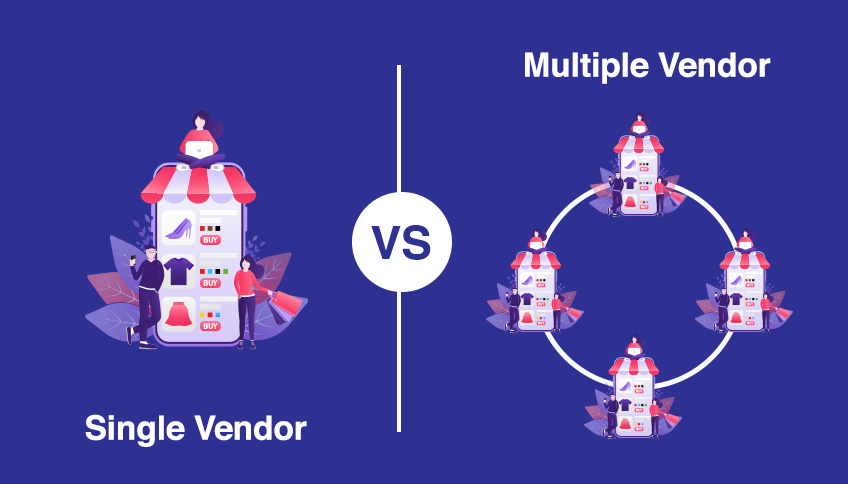Choosing from single vendor vs. multi-vendor becomes easier when you have all the details of benefits of the same. get to know the same here.
Factors to consider when deciding between single vendor vs. multi-vendor
In today’s critical business environment, outsourcing has taken a centre stage due to the effectiveness of the process. Many businesses consider outsourcing because of its effectiveness and availability of making a choice from single vendor vs. multi-vendor. The facility of outsourcing is available with many service providers working as an eCommerce development company.
Considering this, it’s understandable that businesses might get confuse when it comes to choosing the right options for outsourcing. There may prevail a confusion whether to:
- Select a single vendor- for assigning them to implement all project related tasks.
- Choosing multiple suppliers – for selecting a specialized supplier for a specific task.
Therefor, to bring clarity to businesses, here is a detailed discussion on factors to consider when you need to decide.
Factors to consider when deciding between single vendor vs. multi-vendor
Complexity
The complexity is in regards in integrating and implementing solutions for the business. Although businesses today wish to go for trend i.e. to make everything compatible. However, there are still legacy systems that are made differently and are not created using common underlying software architectures or principles.
Single Vendor: A single vendor has the advantage of only needing to integrate its own product with your existing systems. While this can be challenging, it involves a closed set of details to manage.
Multi-Vendor: The responsibility falls on you to integrate everything. Managing multiple systems with numerous details can be complex, and few external vendors can seamlessly integrate everything into a cohesive whole without incurring significant costs.
Best-of-breed
The term “best-of-breed” speaks for itself, but to clarify: it refers to a product that is widely recognized by experts as the best in its category. Typically, this applies to a specific module or product that excels in one particular feature. It’s challenging for a single solution to be the best at everything. While an integrated solution might be excellent overall, not every component will be top-notch. This is why many businesses assemble solutions by selecting individual components from different vendors. Regarding vendor types:
Single Vendor: It’s unlikely to get best-of-breed functionality for every feature from a single vendor. However, with careful selection, you can find a vendor that excels in one or several areas. If you choose this option, ensure you do thorough research!
Multi-Vendor: The primary advantage of a multi-vendor solution is the ability to select the best products for each specific feature from different vendors.
Cost
With these two distinctive categories, the prices would differ from each other. Here is a brief.
Single vendor – Opting for this option will likely remain lower in price all due to better volume discount.
Multi-vendor – The price for this option will be a bit higher. This is because it needs buying of separate individual modules to constitute the package taken as solution.
Implementation
This highlights the potential challenges you may encounter during the installation and setup of your chosen system.
Single Vendor: Implementing a single-vendor solution is generally simpler, as it involves integrating just one set of programs and protocols with your existing systems.
Multi-Vendor: Deploying a multi-vendor solution typically demands more effort, as it requires coordinating the integration of various systems, which may be disparate and potentially incompatible.
Procurement
Acquiring systems involves a few considerations. The complexity of the process varies depending on the approach you choose:
Single Vendor: It’s relatively simple since you only need to deal with one vendor. This streamlines negotiations and contract management.
Multi-Vendor: This approach is more complex and requires more effort. You’ll need to negotiate contracts with multiple vendors, and these contracts may have different lengths and renewal schedules. Managing these variations can be challenging.
Product upgrade
In today’s fast-paced world of product updates and upgrades, what can you expect from your vendor packages?
Single Vendor: Major updates to single-vendor solutions tend to be less frequent but more comprehensive when they do occur. These updates usually involve significant improvements and new features.
Multi-Vendor: With a multi-vendor approach, you can expect more frequent updates from each individual vendor. However, this could lead to potential integration issues, as frequent updates from different sources may not always align seamlessly.
Training staff
When it comes to software and business IT, training is essential to maximize the benefits of your solution. This is especially true for technology. The key question is how much support and training you will receive.
Single Vendor: You and your staff will likely require less training overall, but you can expect more training sessions from the vendor. Additionally, you may have access to online user guides and resources.
Multi-Vendor: You and your staff will likely need more training due to the complexity of integrating multiple systems. However, you might receive less training support from each vendor since your purchase represents a smaller order for them.
Vendor Survival
This is crucial. You want your vendor to provide products, upgrades, and support for years to come.
Single Vendor: If you choose a large, established single vendor, they’re likely to remain in business for the long haul, ensuring continuous support and upgrades.
Multi-Vendor: This approach can be more complex. Smaller companies might offer best-in-breed solutions for specific areas, but their size could mean they lack the business volume to stay afloat. Alternatively, if they become successful, larger companies might acquire them, which could lead to uncertainty about the product’s future availability and support.
In Conclusion
Still not sure about which option to choose? It is best for you to contact a company offering website development services to understand more on it. There are experienced service providers who can help you with the right services. However, ensure your requirement meets the list of services they offer. A prior discussion in the same direction will help to gain insightful information. It will also help you to decide which service to choose.
For more information of website development services, you can contact the expert team of IDS Logic. We have services that could affordably cater to your requirement of getting the services as needed for the business.
Let’s Connect!











